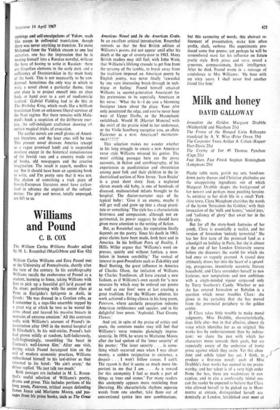Williams and Pound
C. B. COX
The William Carlos Williams Reader edited by M. L. Rosenthal (MacGibbon and Kee 42s) William Carlos Williams and Ezra Pound met at the University of Pennsylvania, shortly after the turn of the century. In his autobiography Williams recalls the exuberance of Pound as a student, learning to fence, taking Williams with him to pick up a beautiful girl he'd passed on the street, performing with the senior class at Penn in Euripides's iphigenia in Aulis, in Greek: 'He was dressed in a Grecian robe, as I remember it, a toga-like ensemble topped by a great wig at which he tore as he waved his arms about and heaved his massive breasts in ecstasies of extreme emotion.' All this contrasts sadly with Williams's account of Pound's in- carceration after 1945 in the mental hospital at St Elizabeth's. In his mid-sixties, Pound's hair had grown wildly at random, half-ludicrously, half-frighteningly, resembling 'the beast in Cocteau's well-known film.' After one visit, during which Pound harangued him on the evil of modern economic practices, Williams unburdened himself to his taxi-driver as they returned to his hotel: 'He ain't crazy,' the dnver replied. 'He just talk too much.' Both passages are included in M. L. Rosen- thal's useful selection of Williams's poetry, drama and prose. This includes portions of his long poem, Paterson, critical essays defending James Joyce and Marianne Moore, and pas- sages from his prose books, such as The Great American • Novel and in the American Grain. In an excellent critical introduction, Rosenthal reminds us that the first British edition of Williamss poems did not appear until after his death at the age of seventy-nine in 1963. Many British readers may still feel, with John Wain, that Williams's lifelong crusade to get free from the tyranny of the iambic, to break away from the tradition imposed on American poetry by English poetry, was never finally 'rewarded by any very interesting break-through in tech- nique or feeling.' Pound himself attacked Williams (a second-generation American) for his pretensions to be especially American in his verse: 'What the h-1 do you a blooming foreigner know about the place. Your pere only penetrated the edge, and you've never been west of Upper Darby, or the Maunchunk switchback. Would H. [Harriet Monroe] with the swirl of the prairie wind in her underwear,
or the Virile Sandburg recognise you, an effete Easterner as a REAL American? INCONCEIV- ABLE!! Ill'
This selection makes me wonder whether in his long struggle to create a new American verse style Williams misused his genius. The most striking passages here are the prose accounts, in fiction and autobiography, of his experiences as paediatrician and obstetrician among poor folk and their children in the in- dustrialised section of New Jersey. 'Jean Beicke' is a great short story. Jean, a neglected eleven month old baby, is one of hundreds of diseased, malnourished infants brought to the hospital. The doctor-narrator says of the typical baby: 'Give it an enema, maybe it will get well and grow up into a cheap prosti- tute or something.' The style has a characteristic bitterness and compassion; although not ex- perimental, its power suggests he should have given more attention to the writing of fiction.
But, as Rosenthal says, his reputation finally depends on the poetry. Since his death in 1963, great claims have been made, both here and in America. In his brilliant Poets of Reality, J. Hillis Miller argues that 'Williams's work ex- presses, quietly and without fanfare, a revo- lution in human sensibility.' The revival of interest in post-Poundians such as Zukofsky and Basil Bunting, the great influence in America of Charles Olson, the imitation of Williams by Charles Tomlinson, all have created _a new fashion, as if Williams's own search for 'a new measure by which may be ordered our poems as well as our lives' were at last creating a great tradition. For the Williams admirer, his work achieved a fitting climax in his long poem, Paterson, where aesthetic perception redeems American ruthlessness and squalor, and in his delightful love poem, 'Asphodel, That Greeny Flower.'
And yet, in spite of the praise of critics and poets, the common reader may still feel that Williams's verse remains glancingly impres- sionistic. In 1934, he wrote to Marianne Moore after she had spoken of the 'inner security' of his poems: 'The inner security . . . is some- thing which occurred once when I was about twenty, a sudden resignation to existence, a despair . . . I won't follow causes. I can't. The reason is that it seems so much more im- portant to me that I am.. . . As a reward for this anonymity I feel as much a part of things as trees and stones.' For many readers this anonymity appears more restricting than Berating. His characteristic rhythms separate words from one another, take them• out of conventional syntax into new combinations; but this savouring of words, this abstract re- finement of presentation, make him often prolix, slack, verbose. His experiments pro- duced some fine poems: yet perhaps he will be remembered most for his influence on future poetic style. Both prose and verse reveal a generous, compassionate, frank intelligence. After he died, Pound wrote in a message of condolence to Mrs Williams: 'He bore with me sixty years. I shall never find another friend like him.'






























 Previous page
Previous page